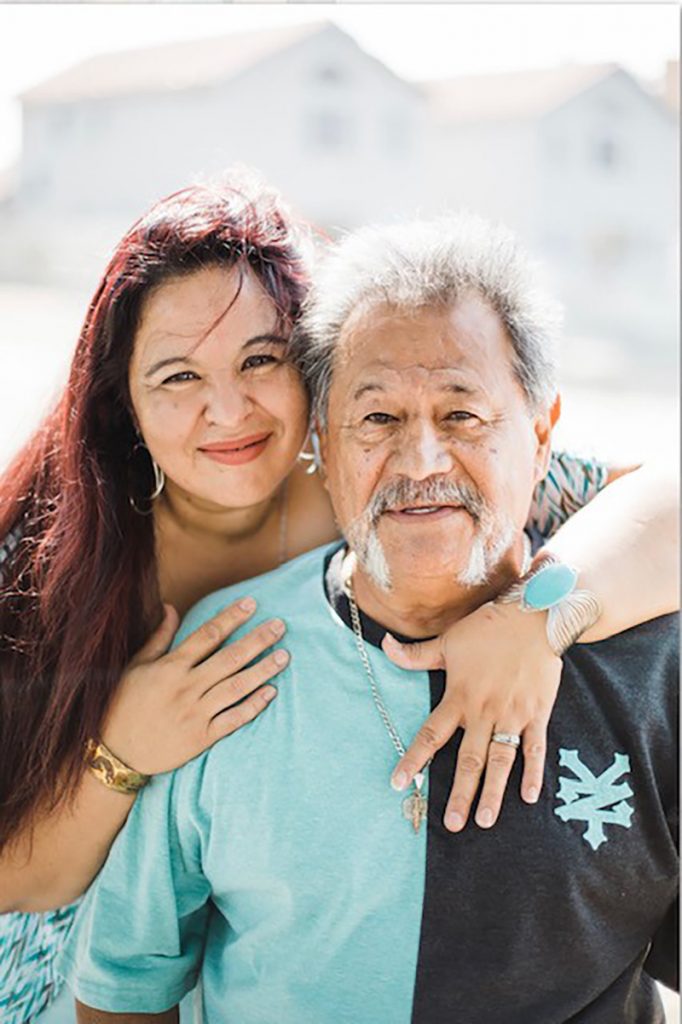New program supervisor: ‘There is always a purpose for our trials’
Five months ago, the Rescue Mission Alliance Victor Valley opened its first-ever emergency shelter for women. In a comprehensive hiring search for the person to run the shelter, one woman stood out above the rest. Amalia is such a vital member of the team, and she has already been an incredible guiding light to the women calling the shelter their temporary home.

Amalia, far right, runs the Mission’s new women’s shelter.
Amalia hasn’t always had an easy-going life however, experiencing both homelessness and addiction along the way. She started drinking alcohol and running away from home when she was 13. “I was always a runner,” she said. “And back in the day it was so easy to walk to a liquor store and offer a person money if they bought alcohol for you. Instead of going to school, we would drink all day at the park. It went from liquor to weed to meth and everything else.”
At 16 years old she became pregnant with her first child. She went on to marry her husband, an Army veteran, who she met when they both became homeless. They lived in a tent in the woods, eventually losing custody of both her children. “When it snowed we would go to the campground and plug in a heater to get warm,” she said. “We tried not to plug it in often because the heat would melt the snow and water would come into our tent. I would get frost bite on my fingers and toes. It wasn’t a good way to live. In my addiction I just wanted to be away from everyone. I was running from my family and myself.”
One day, Amalia and her husband volunteered at a food pantry in Fontana—her husband had community service he needed to complete. “While I was there, a lady asked if I knew the Lord. She asked if she could pray for me. My relationship with God started that day.”
Amalia is careful to note that her relationship didn’t flourish overnight. “It was hard because I was living in the streets in my addiction,” she said. “I would push my cart around, getting up early to go look for cans. I would steal. It was devastating being a woman on the streets. I had no bathroom, no pads for my monthly (menstruation cycle), nowhere to shower.”
Her husband fell gravely ill, his body shutting down from the alcohol, opiates from the doctors, and the street drugs he took on his own time. When she signed her husband over to the hospice care team, she was “so messed up from the drugs, I couldn’t even understand what was going on.
“In a moment of clarity, I asked the nurses if I could take my husband home to die. The nurses said, ‘You are homeless, you don’t have a home.’ That is the last day I ever did drugs.”
Amalia rented a hotel room and that week, they attended a church service. “The ushers had to carry him in because he was just bones.” It was there that she rededicated her life and her husband gave his life to Christ. “He walked out of that service by himself. It scared me to see the power of God moving like that.”
Amalia’s husband got better as each day passed. Fifteen years later, he is still alive. Amalia entered a court-ordered program, and started attending church on a regular basis. She was in the program for two years. She’s now been clean for 13 years. She and her husband have four adult children, four grandchildren, and one great grandbaby—plus two dogs. “My relationship with my family and children is 100 percent better,” she said. “I talk to them every day. I get to be a part of their lives.”
Amalia began volunteering at her church, teaching Sunday School to young children. “The kids would say, ‘Ms. Amalia, that’s not how you spell Matthew’ or ‘Genesis.’ I was ashamed and embarrassed. I went back to high school and got my diploma. That was four years ago. I’m now attending Liberty University.”
About eight months ago, Amalia met Mission Director Bill Edwards when he gave his testimony at a Celebrate Recovery meeting. She had just applied for a job at the Mission—little did she know that plans for a women’s shelter were already underway and that’s where she belonged. “God was already working on it for me,” she said. “There is always a purpose for our trials. I have a whole new family now.”
